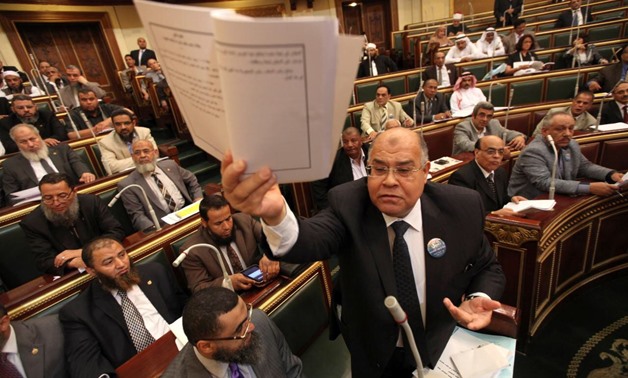
A member of the upper house of the parliament talks during a session in Cairo, Egypt June 10, 2013. REUTERS/Mohamed Abd El Ghany/File Photo
CAIRO - 8 January 2018: Many parliamentarians have called for preventing organizations, known for suspicious activities or for having a history of illegal financial resources, from monitoring the upcoming presidential election that is due in a few months.
Speaker Ali Abdel Aal has received a parliamentary memorandum demanding prevention of "NGOs which defame the image of the Egyptian state" from monitoring the upcoming presidential election.
According to the memorandum, those NGOs have exported false information about Egypt’s domestic affairs. Therefore, MP Gamal Kosh uncovered that he had officially submitted a request to Speaker Abdel Aal demanding the minister of justice and the chairperson of the National Election Authority to deprive pro-Brotherhood NGOs of the right to monitor the electoral process.
Kosh told Egypt Today that those organizations which defend the terrorist Brotherhood group have published defaming reports about Egypt. “There are many suspicious NGOs such as Cairo Center for Human Rights, Nadeem Center, Arab Network for Human Rights Data, Ibn Khaldoon Center...etc,” he added.
MP Riyad Abdel Sattar asserted that most of the operating NGOs are biased to specific views, adding, “They are not neutral in covering Egypt’s events.”
He criticized the NGOs’ stance against the state’s interest. “The NGOs monitoring the elections must be responsible, non- biased in covering different topics and credible.”
In October 2017, Speaker Ali Abdel Aal headed a parliamentarian delegation that visited the U.S. where Abdel Aal gave a speech during a seminar in the Middle East Institute, which is the biggest research and analysis center in Washington.
Abdel Aal confirmed that Egypt’s new NGO Law is based on three important principles which are disclosure of the source of money, transparency in spending, and accounting rules in these organizations.
He added that the law has not yet been implemented and executive regulations were not issued. The newly approved NGO Law should regulate over 48,000 NGOs in Egypt.
President Abdel Fatah al-Sisi approved the new NGO Law on May 31, 2017, after it was ratified by the House of Representatives last November following several months of discussions and study.
On August 22, 2017, Washington decided to withhold almost $300 million from Egypt over what it deemed a “controversial NGO Law,” referring to the new law.
Egypt is still trying to recover from the impacts of the Muslim Brotherhood’s one year in power. The Muslim Brotherhood began as a charity group, before branching into the political arena. Most of the Brotherhood’s violent affiliates were recruited and trained as militias through the so-called “charity organization,” owned and operated by the MB since the early 2000s.
Egypt is not the only country in the world that seeks to legally regulate the work of civil society. Well-established democracies, such as the United States and the majority of European countries, have laws that govern civil society and allow the state to monitor and supervise NGO work. The new NGOs Law gives the organizations a one-year time span to comply with the new terms or they will have to suspend their activities and shut down.
Despite the fact that civil society and non-governmental organizations work voluntarily and contribute to charity efforts, they have been abused in more than one instance by illegal groups for political gains, according to a study released by the Liberal Democracy Institute (LDI), an Egyptian think tank. The United States and European countries have suffered at the hands of these groups; a case in point being the outlawed Muslim Brotherhood and its Palestinian branch, Hamas.
The new NGO Law encourages foreign NGOs to work in Egypt. Unlike the old NGO Law no. 84/2002, it has devoted two full sections to explain the fine details of how a foreign NGO or its representative office may register, operate, and receive funds for its projects.
The new NGO Law also allows foreign communities living in Egypt to establish their own bond or association as a foreign NGO, to defend the community’s interests and offer not-for-profit services to the members of the community
The new NGO Law has resolved the problem of approving foreign funds that local NGOs suffered under the old law and created a new mechanism for the new law governing the establishment, operation and funding of NGOs under one umbrella instead of different entities and ministries.


Comments
Leave a Comment